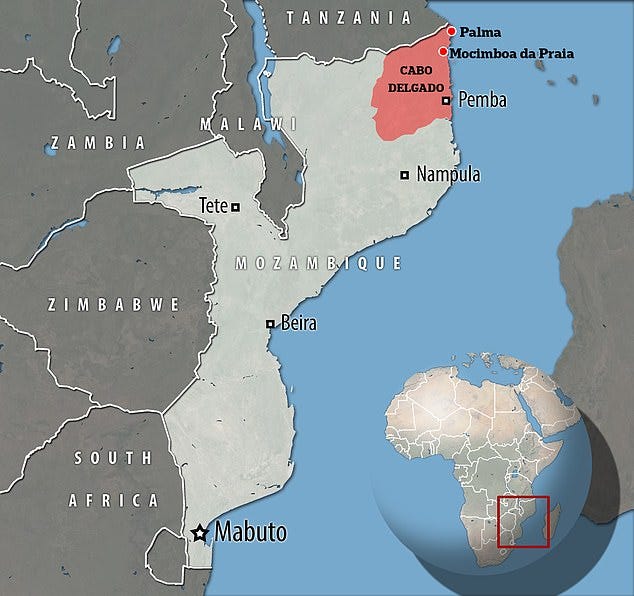MW Flashpoints: The Islamic State Insurgency in Mozambique and Its Threat to Global Commercial Interests
Flashpoints is a new series by Militant Wire that examines the world’s most dangerous conflict zones and their potential impact on global security.
The ongoing insurgency in Mozambique’s northern province of Cabo Delgado poses a significant threat to both the global energy sector and container traffic in the region. With liquified natural gas (LNG) demand at an unprecedented high, major energy companies have set their sights on Cabo Delgado’s substantial offshore reserves. However, the risks posed by the region’s unstable security situation have resulted in high costs and reluctance among investors. Although the situation has improved somewhat over the past year, the conflict is unlikely to end soon and could threaten commercial interests in the region for years to come.
Described as a “smuggling paradise”, Cabo Delgado is characterized as having weak governance and being rich in natural resources such as gold, rubies, timber, and over 100 trillion cubic feet of offshore gas reserves. It is also a major transit hub for the global narcotics and wildlife trade. Moreover, the coastal province is of strategic importance as it lies along the Mozambique Strait, a crucial transit chokepoint that hosts some 30 percent of global tanker traffic. Since 2017, Cabo Delgado has been home to an insurgent movement — now an Islamic State (IS) branch — that launched a multi-pronged and sustained attack on the gas-rich coastal town of Palma in April 2021. These attacks prompted the withdrawal of a US $20 billion investment by French energy giant Total shortly thereafter. Although Total has since stated it plans to restart work on the project by March of 2023, challenges remain.
On November 13, the first Mozambican gas shipment to Europe was completed via an offshore LNG facility operated by the Italian energy firm Eni as part of a consortium led by Exxon Mobil. However, the business environment remains challenging with Lloyd’s and the International Underwriting Association (IUA) having labeled coastal Cabo Delgado as a “listed area” following the Palma attacks: as such, shipowners are now required to inform their underwriters of plans to operate in the region, causing insurance rates to rise. Although Mozambique’s Finance Minister has stated that the “direction is good” regarding Total’s return to the troubled region, he is “not so optimistic” that ExxonMobil will reach a long-awaited final investment decision on a second offshore platform in the short term.
Militant Wire now offers regularly published research and analysis accessible to paid subscribers. Recent exclusive articles include:
• Islamic State Boasts Legacy of Battles in Fallujah and Lasting Psychological Impact on America; Pro-IS Media Targets Saudi Arabia Following Islamabad Embassy Threat Warning
• Al-Qaeda Says Al-Shabaab Set to Takeover Somalia, Compares to Taliban in Afghanistan, Believes US a "Paper Tiger" in Decline
• Operations and Weapons Profile of Russia's Controversial Rusich Reconnaissance, Sabotage, and Assault Group
• Detention of Former Serb Police Officer Brings Kosovo Back to the Brink
• Key Cartel Leader's Arrest Spurs Chaos and Violence in Culiacán, Mexico
• Islamic State Khurasan's International Target Strategy: Suicide Bombing Aimed at Taliban Foreign Ministry and Chinese Diplomats
The IS insurgency in Cabo Delgado remains a powerful one, having recently conducted cross-border incursions into neighboring Tanzania. The United States Agency for Migration estimates that 950,000 individuals have been displaced as a result of the ongoing conflict. The group has proven capable of seizing weapons from the Mozambican military and is believed to have attracted foreign fighters. Moreover, the insurgents possess basic maritime capability and have been known to commandeer small vessels to conduct raids on villages as far as 100 kilometers away. These risk factors are unlikely to sit well with multinational corporations, lenders, and insurers moving forward.

The Institute for Security Studies (ISS) has described the Mozambican government’s initial response to the Palma attacks and the subsequent crisis as “adopting the African playbook”: first denying its existence, then appealing to the African Union (AU) for help when overwhelmed. In an attempt to control the situation, Maputo initially relied on mercenaries such as Russia’s Wagner Group, who quickly withdrew from a train and support mission after heavy losses in 2019, and the South African Dyck Advisory Group, which Amnesty International has since accused of war crimes in the region.
Although the security situation remains highly volatile, there has been some reported improvement. The United States Institute of Peace has noted a marked improvement to the security situation in Cabo Delgado due to the presence of 2,000 troops from the Southern African Development Community Mission in Mozambique (SAMIM) as well as a 1,000-troop contingent from Rwanda. The growing threat has caught the attention of Washington with the US military recently conducting joint exercises with Tanzania following a direct appeal for support by South African president Cyril Ramaphosa. Washington has also gifted a 33-foot US $700,000 high-speed patrol boat to Mozambique to enhance security in the Mozambique Strait.
The influx of LNG-related investment to Cabo Delgado comes at a time of unprecedented global energy demand amid the ongoing conflict in Ukraine. With the United States now tied with Qatar as the world’s largest LNG exporter, global suppliers are beginning to fill the gap in European demand that had previously been fulfilled by Russia, although a shortfall is still likely for 2023. The high risk of operating in Cabo Delgado coupled with high insurance costs have resulted in what appears to be reluctance among global investors. Although regional and global actors are working to secure the situation at present, it remains to be seen whether this support will continue, especially in the event of high troop casualties. Should this support cease, it could result in a power vacuum that would threaten global shipping traffic in the Mozambique Strait moving forward.





In the map, should read Maputo, not mabuto.